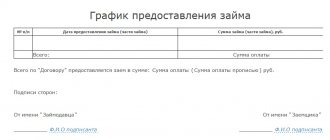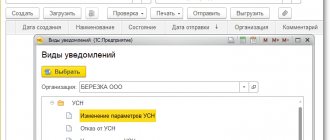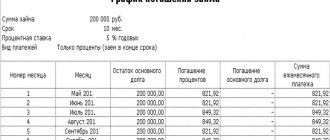Lack of primary document
If you have not completed the required primary document and this is discovered during a tax audit, you may be fined.
Thus, Article 120 of the Tax Code of the Russian Federation qualifies “the absence of primary documents, invoices or accounting or tax registers” as “a gross violation of the rules for accounting for income, expenses and taxable items.”
The fine for such a violation is 10,000 rubles. If such violations are committed repeatedly in different tax periods, the fine increases to 30,000 rubles.
If such a violation resulted in an “understatement of the tax base,” the fine will be 20% of the amount of unpaid tax, but not less than 40,000 rubles.
Keep in mind
From January 1, 2014, Article 120 of the Tax Code applies not only to companies, but also to entrepreneurs.
There is another danger. Article 252 of the Tax Code of the Russian Federation defines reasonable and documented expenses as expenses.
If a document confirming the expenses incurred by the organization (for example, an acceptance certificate for completed work) is not executed or is drawn up with serious violations, the tax office may not accept such expenses for tax purposes.
As a result, you will be charged the underestimated tax amount, as well as penalties.
In addition, the inspection may impose a fine under Article 122 “Non-payment or incomplete payment of amounts of tax (fee)” of the Tax Code, which provides for a fine of 20% of the unpaid amount of tax (fee), and acts committed intentionally entail a fine of 40%.
However, here it is necessary to point out an essential point: the tax inspectorate does not have the right to present demands for the payment of fines for the same violation simultaneously under Articles 120 and 122 of the Tax Code (determination of the Constitutional Court of the Russian Federation of January 18, 2001 No. b-O).
If you underestimated the tax base and did not pay the tax due to a gross violation of accounting rules, you will be fined under paragraph 3 of Article 120. If you underestimated the tax base and did not pay the tax for another reason, you will be fined under Article 122.
If the tax inspectorate has imposed fines on you simultaneously under the two above-mentioned articles for the same violation, do not rush to agree with it.
In such a situation, tax officials are unlikely to be able to prove their case in arbitration court.
Meanwhile, many local tax inspectors interpreted other provisions of tax legislation in their own way. So, for example, if an organization drew up a document in any form for a transaction for which a standard form is provided, tax authorities could classify this as a “gross violation of the rules for accounting for income, expenses and taxable items.”
The inspectors could draw the same conclusion even if the organization did not fill out all the required details of the standard form.
Not all details are filled in
As arbitration practice shows, in such cases the courts often take the side of taxpayers.
EXAMPLE
The LLC transferred funds to the foreign partner to pay for consulting services.
However, the act confirming the provision of services did not contain all the necessary details. During the on-site inspection, tax inspectors regarded this as a violation of the Federal Law “On Accounting” and excluded the amount paid to the foreign partner from the cost price.
As a result, it was decided to assess additional tax, as well as to collect penalties and fines from the enterprise.
The enterprise did not agree with the inspection's decision and appealed to the arbitration court.
Having studied the case materials, the court sided with the enterprise. He, in particular, pointed out that “minor deficiencies in the preparation of primary documents ... do not indicate the absence of a business transaction, as well as the absence of expenses for the company to pay for consulting services.”
Due to the abolition of the mandatory use of unified forms of primary documents, companies should reduce the number of disputes with inspectors. Controllers will no longer be able to “remove” expenses due to improperly executed documents, since the requirement to use standard forms of documents does not exist from January 1, 2013 (Article 9 of the Federal Law of December 6, 2011 No. 402-FZ).
Poor quality document from a partner
Here's another example. It shows that if you received an unfinished document from your partner, this does not mean that penalties can be imposed on your company.
EXAMPLE
The tax inspectorate conducted an on-site audit, as a result of which it was decided to hold the company accountable. The basis for this decision was, in particular, the lack of invoices in the 1-T form. However, the court did not agree with the point of view of the tax authorities, pointing out that the fact that the company posted the purchased goods was confirmed by invoices in the TORG-12 form. In response to this, the tax inspectorate gave another argument: in the invoices (TORG-12) there is no reference to the number and date of the invoice. But the arbitrators did not agree with this argument either, emphasizing that “the absence of a reference to the number and date of the waybill, upon actual acceptance of the goods for registration, confirmation by witnesses of the fact of delivery of the goods by the supplier, does not indicate the absence of delivery of the goods” (resolution of the Federal Antimonopoly Service of the West Siberian District dated September 22, 2010 in case No. A27-391/2010 (by decision of the Supreme Arbitration Court of the Russian Federation dated January 21, 2011 No. VAS-67/11, the case was refused to be transferred to the Presidium of the Supreme Arbitration Court of the Russian Federation for review in the order of supervision)).
What about taxes?
Recalculation of taxes is the final stage in the process of restoring primary documents, which is often carried out in the absence of most of the documents. Therefore, the tax base and accounting data will not coincide with the data in the company’s primary documents, and tax authorities will have the opportunity to assess additional taxes and use penalties and interest, which the taxpayer can avoid if he independently recalculates and pays additional taxes by submitting updated calculations to the Federal Tax Service.
Summarizing the information presented, it is recommended to take all necessary measures to restore lost primary documents, since established judicial practice does not exclude their loss through the fault of the taxpayer. Therefore, the taxpayer’s inaction in such a situation may be considered illegal and lead to the commission of a tax offense through negligence, and vice versa, even unsuccessful attempts to restore documents will become a compelling argument in the event of claims from the tax authorities.
Administrative responsibility
For the same violations, the magistrate, at the initiative of the tax authorities, may impose an administrative fine of 2,000 to 3,000 rubles on the head or chief accountant of the organization (Article 15.11 of the Code of Administrative Offenses of the Russian Federation).
Please note: this fine is imposed only if a violation of accounting or tax rules resulted in:
· distortion of the amounts of accrued taxes and fees by at least 20%;
· distortion of any article (line) of the financial reporting form by at least 20%.
Some lawyers believe that such actions by tax officials are unlawful, since they allow them to be repeatedly prosecuted for the same offense.
Unfortunately, it is not. The fact is that for gross violations in the preparation of documents under Article 120 of the Tax Code, the organization is held liable, and under Clause 15.11 of the Code of Administrative Offenses of the Russian Federation - its officials.
This situation is directly allowed by paragraph 4 of Article 108 of the Tax Code, according to which “bringing an organization to responsibility for committing a tax offense does not relieve its officials, if there are appropriate grounds, from administrative, criminal or other liability provided for by the laws of the Russian Federation.”
Officials are exempt from administrative liability for such violations if they:
- filed an updated tax return (calculation) and paid the arrears and penalties provided for in paragraphs 3, 4 and 6 of Article 81 of the Tax Code;
- corrected errors in accordance with the established procedure (including the submission of revised financial statements) before approval of the financial statements.
The best solution for an accountant
Berator "Practical Encyclopedia of an Accountant" is an electronic publication that will find the best solution for any accounting problem. For each specific topic there is everything you need: a detailed algorithm of actions and postings, examples from the practice of real companies and samples of filling out documents - e.berator.ru
Practical encyclopedia of an accountant
All changes for 2021 have already been made to the berator by experts. In answer to any question, you have everything you need: an exact algorithm of actions, current examples from real accounting practice, postings and samples of filling out documents.
Rules for registration of “primary”
According to Law No. 402-FZ, primary documentation is created for each fact of the enterprise’s economic activity and includes all the details specified in Part 2 of Article 9 of this law:
- document's name;
- date of creation;
- name of the economic entity, author of the document;
- the fact for which the document is created;
- monetary and (or) natural measurement of goods/services;
- the position of the one who made the transaction and is responsible for the correct execution of this event;
- signature with a transcript of the surname and initials of the person responsible for drawing up the documentation.
A document entered into the electronic database must have an enhanced qualified electronic signature.
Primary documents: consequences of absence
Materials from the newspaper “Progressive Accountant”, March 2021.
Anna Vorontsova, lawyer, head of contract law and civil disputes at the Rostov Regional Bar Association “Sovetnik”.
The greatest discussions, as a rule, are caused by questions of civil law consequences of the absence of primary accounting documents. What are the consequences in the civil law sphere of an organization’s lack of or failure to provide a primary accounting document to a counterparty?
Clause 1 Art. 9 of the Federal Law of December 6, 2011 No. 402-FZ “On Accounting” determines that each fact of economic life is subject to registration as a primary accounting document. The same norm states: “it is not allowed to accept for accounting documents documents that document facts of economic life that have not taken place, including those underlying imaginary and feigned transactions.”
In this case, a fact of economic life should be understood as a transaction, event, operation that has or is capable of influencing the financial position of an economic entity, the financial result of its activities and (or) cash flow.
Art. 9 of the Federal Law of December 6, 2011 No. 402-FZ “On Accounting”, called “Primary Accounting Documents” and entirely devoted to this issue, also defines the mandatory details of the primary accounting document, the time of its preparation, as well as the procedure for determining its form.
The consequences of the lack of necessary primary accounting documents lead to the possibility of the following consequences:
- civil law;
- administrative;
- tax.
In this case, it would also be appropriate to talk about possible disciplinary (at the discretion of the business entity) and criminal liability of employees of the business entity.
Let's take a closer look at the civil consequences.
1. Failure to provide the counterparty with the primary accounting document may result in the application of a fine if such a condition is agreed upon in the contract/agreement concluded between the parties. Nowadays, it is a very common practice to include conditions in the contract, according to which failure to provide/late provision of primary accounting documents entails the application of a fine to the violator.
2. If, as a result of your failure to provide primary accounting documents, the counterparty suffers losses, these losses may be assigned to you. The conditions for the recovery of damages in this case will be several factors, one of which is a correctly drawn up contract including, in particular, relevant representations about the circumstances.
3. The absence of a primary accounting document confirming your relationship with the counterparty will make it difficult, and in many cases with a high degree of probability, will not allow you to collect from him the debt arising as a result of such relationships.
In certain cases (when collecting debt under contract-type agreements, for example), other evidence may come to the rescue (for example, conducting an examination to determine the fact and quality of work performed). In other relationships, it often becomes impossible to confirm the occurrence of a debt (for example, under a contract for the supply of individually uncertain items).
Judicial practice is developing in such a way that the courts point out the need for participants in civil transactions to document the facts of their economic life and refuse to satisfy demands for debt collection on the basis of indirect evidence (for example, the Resolution of the Arbitration Court of the North Caucasus District in case No. A53-3848/2017 dated 01/19/2018).
4. Your lack of primary documents (contradiction with other documents) may lead to doubt about the reality of the relevant relationship (delivery made, services provided, etc.), recognition of the relevant transaction as imaginary or feigned (for example, Resolution of the Third Arbitration Court of Appeal dated September 26. 2018 in case No. A33-9990/2017, Resolution of the Arbitration Court of the Ural District dated September 19, 2017 No. F09-4868/17 in case No. A60-44638/2015). This, in turn, can lead to extremely negative tax consequences.
Separately, I would like to dwell on the possible consequences of the lack of the “correct reaction” to the documents provided by the counterparty, namely a reasoned refusal to sign, for example, a certificate of work performed or a certificate of services rendered. It is now quite popular to include in contracts (this is especially true for contract-type contracts) a condition that failure to provide a reasoned refusal to accept work/provide services within a certain period of time from the date of submission of the certificate means that the work has been completed (option: services have been provided) , and the act is considered signed. We, of course, recommend including such wording in the contract if you are the contractor, but we do not recommend it if you are the customer.
However, regardless of your role in the contract, you should always take into account in your work that such wording really “works”, and the courts will recognize the absence of a reasoned refusal as evidence that the work has been completed (services have been provided) in the absence of compelling evidence to the contrary. Even just the presence in the contract of a period for providing a reasoned refusal of the act in the absence of further decoding on the recognition of the act as signed will most likely entail similar consequences.
If you find an error, please select a piece of text and press Ctrl+Enter.
Rules for storing primary accounting documents, transferring them to archival storage, withdrawal (removal)
When storing primary accounting documents, organizations are also guided by the Regulations on Documents and Document Flow in Accounting, approved by the USSR Ministry of Finance on July 29, 1983 N 105 (hereinafter referred to as the Regulations on Document Flow), GOST R 51141-98 “Office work and archiving. Terms and definitions”, approved by Resolution of the State Standard of Russia dated February 27, 1998 N 28.
In all cases, the chief accountant of the organization bears responsibility for the safety of primary accounting documents.
In accordance with Section 6 of the Regulations on Document Flow, before being transferred for archival storage in the organization itself or in the relevant archives, primary documents must be stored in the organization's accounting department in special rooms or in locked cabinets under the responsibility of persons authorized by the chief accountant. Strict reporting forms are stored in safes or metal cabinets.
Before the formation of cases, it is recommended to store primary accounting documents for the purpose of preserving them, filed in special thematic folders. Processed (registered) documents related to a specific accounting register must be compiled in chronological order and bound. Certain types of documents (work orders, shift reports) can be stored not bound, but filed in folders.
Every month, based on the results of registration of accounting registers, it is recommended to sew documents into thematic files stored in the above order.
The issuance of primary documents from accounting and archives to employees of other structural divisions, as a rule, is not allowed, and in some cases can only be done by order of the head of the organization or the chief accountant.
In some cases, primary accounting documents may be seized by authorized bodies. Thus, in accordance with paragraph 8 of Article 9 of the Law on Accounting, primary documents can be seized by the bodies of inquiry, preliminary investigation and prosecutor's office, courts, tax inspectorates and tax police on the basis of their decisions in accordance with the legislation of the Russian Federation.
When seizing primary documents, tax officials, in particular, are guided by Articles 93 - 94 of the Tax Code of the Russian Federation and Instruction of the Ministry of Finance of the RSFSR dated July 26, 1991 N 16/176 “On the procedure for the seizure by an official of the state tax inspectorate of documents evidencing on concealment (understatement) of profit (income) or concealment of other objects from taxation for enterprises, institutions, organizations and citizens.”
When carrying out a seizure (seizure), the chief accountant or other official has the right, with the permission and in the presence of representatives of the authorities conducting the seizure of documents, to make copies of them indicating the reason and date of seizure. If unfinished volumes of documents are seized (not filed, not numbered, etc.), then with the permission and in the presence of representatives of the authorities making the seizure, the relevant officials of the organization can complete these volumes (make an inventory, number the sheets, lace, seal, certify with your signature and seal).
In all cases, the seizure (seizure) of documents must be documented in a protocol, a copy of which is handed over to the relevant authorized official of the organization against receipt.
Additional taxes
The absence of primary documents will not save taxpayers from additional taxes, since Article 31 of the Tax Code of the Russian Federation allows tax authorities in such situations to use the so-called calculation method for additional taxes, based on the information they have about the taxpayer. Tax officials can also use the data to calculate similar taxpayers in cases where the taxpayer refuses to allow tax officials to inspect production, warehouse, retail and other premises, as well as territories used to generate income. Tax authorities can also use data on similar taxpayers when they are not provided with the documents necessary for calculating taxes for two or more months, as well as due to the lack of accounting for income and expenses, accounting for taxable items, or keeping records in violation of the established procedure, which led to inability to calculate taxes.
The current tax legislation of the Russian Federation, while allowing the use of the calculation method for additional tax assessment, does not contain a unified calculation methodology, as well as a set of criteria that should be used to select similar taxpayers. Therefore, tax services have the right to select criteria independently, for example, taking into account, when choosing a similar taxpayer, the similarity of the type of business activity, the amount of revenue received, the number of employees, as well as the value of property and other indicators. Considering that these criteria are not contained in the tax legislation of the Russian Federation, but are chosen by employees of the Federal Tax Service independently, the judicial authorities approve the choice of a similar taxpayer in accordance with the specified criteria.










